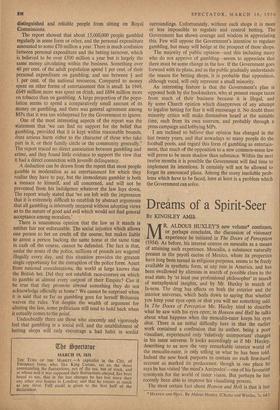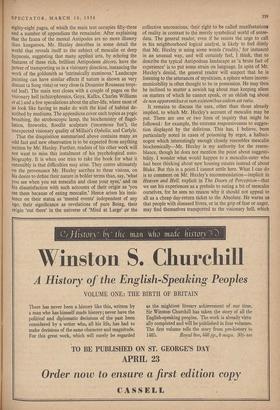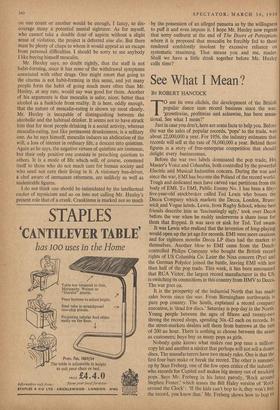Dreams of a Spirit-Seer
BY KINGSLEY AMTS MR. ALDOUS HUXLEY'S new volume* continues, or perhaps concludes, the discussion of visionary experience he initiated in The Doors of Perception (1954). As before, his interest centres on mescalin as a means of attaining such experience. Mescalin, a substance naturally present in the peyotl cactus of Mexico, where its properties have long been turned to religious purposes, seems to be freely available in synthetic form, at any rate in America, and has been swallowed by alienists in search of possible clues to the mad state, by 'at least one professional philosopher' in search of metaphysical insights, and by Mr. Huxley in search of Is-ness. The drug ha,s effects on both the exterior and the interior universes, which boils down to saying that whether you keep your eyes open or shut you will see something odd. In The Doors of Perception Mr. Huxley tried to describe what he saw with his eyes open; in Heaven and Hell he talks about what happens when the mescalin-eater keeps his eyes shut. There is an initial difficulty here in that the earlier work contained a confession that its author, being a poor visualiser, experienced only 'relatively unimportant' changes in his inner universe. It looks accordingly as if Mr. Huxley, describing to us now the very remarkable interior world of the mescalin-eater, is only telling us what he has been told. Indeed the new book purports to contain no such first-hand account as marked its predecessor, though in one place he says he has visited 'the mind's Antipodes'--one of his favourite synonyms for the world of inner vision. But perhaps he has recently been able to improve his visualising powers.
The most certain fact about Heaven and Hell is that it has
. . -
* HEAVEN AND 1-tELL. By Aldous Huxley. (Chatto and Windus, 7s. 6d.) eighty-eight pages, of which the main text occupies fifty-three and a number of appendices the remainder. After explaining that the fauna of the mental Antipodes are no more illusory than kangaroos, Mr. Huxley describes in some detail the world that reveals itself to the subject of mescalin or deep hypnosis, suggesting that many applied arts, by echoing the features of these rich, brilliant Antipodean decors, have the Power of transporting us in a visionary direction, instancing the work of the goldsmith as 'intrinsically numinous.' Landscape painting can have similar effects if nature is shown as very distant (a Sung vista) or very close (a Douanier Rousseau tropi- cal leaf). The main text closes with a couple of pages on the visionary hell (schizophrenics, Goya, Kafka, Charles Williams et al.) and a few speculations about the after-life, where most of us look like having to make do with the kind of habitat de- scribed by mediums. The appendices cover such topics as yogic breathing, the stroboscopic lamp, the biochemistry of flagel- lation, fireworks, floodlit sculpture ('enormous fun'), the unexpected visionary quality of Millais's Ophelia, and Carlyle.
That the disquisition summarised above contains many an odd fact and new observation is to be expected from anything written by Mr. Huxley. Further, readers of his other work will not want to miss this instalment of his psychological auto- biography. It is when one tries to take the book for what it ostensibly is that difficulties may arise. They centre ultimately on the provenance Mr. Huxley ascribes to these visions, on his desire to define their nature in bolder terms than, say, 'what You see when you eat mescalin and close your eyes,' and on his dissatisfaction with such accounts of their origin as 'you see them because of eating mescalin.' Hence arises his insis- tence on their status as 'mental events' independent of any ego, their significance as revelations of pure Being, their origin 'out there' in the universe of Wind at Large' or the collective unconscious, their right to be called manifestations of reality in contrast to the merely symbolical world of sense- data. The general reader, even if he resists the urge to call in his neighbourhood logical analyst, is likely to feel dimly that Mr. Huxley is using some words ('reality,' for instance) in an unusual way, and will certainly feel, I think, that to describe the typical Antipodean landscape as 'a brute fact of experience' is to put some strain on language. In spite of Mr. Huxley's denial, the general reader will suspect that he is listening to the utterances of mysticism, a sphere where incom- municability is often thought to be in possession. He may then be inclined to mutter a newish tag about man keeping silent on matters of which he cannot speak, or an oldish tag about de non apparentibus et non existentibus eadem est ratio.
It remains to discuss the uses, other than those already implied, to which Mr. Huxley's account of mescalin may be put. There are one or two lines of inquiry that might be followed : for example, the extreme responsiveness to sugges- tion displayed by the delirious. This has, I believe, been particularly noted in cases of poisoning by ergot, a halluci- nogen which interestingly enough closely resembles mescalin biochemically—Mr. Huxley is my authority for the resem- blance, though he does not mention the point about suggesti- bility. I wonder what would happen to a mescalin-eater who had been thinking about new housing estates instead of about Blake. But this is a point. I cannot settle here. What I can do is to comment on Mr. Huxley's recommendation—implicit in Heaven and Hell, explicit in The Doors of Perception—that we use his experiences as a prelude to eating a bit of mescalin ourselves, for he sees no reason why it should not appeal to all as a cheap day-return ticket to the Absolute. He warns us that people with diseased livers, or in the grip of fear or anger, may find themselves transported to the visionary hell, which on one count or another would be enough, I fancy, to dis- courage many a potential mental sightseer. As for myself, who cannot take a double dose of aspirin without a slight sense of violation, the project is deferred sine die. But there must be plenty of chaps to whom it would appeal as an escape from personal difficulties. I should be sorry to see anybody I like buying himself mescalin.
Mr. Huxley says, no doubt rightly, that the stuff is not habit-forming, since it has none of the withdrawal symptoms associated with other drugs. One might retort that going to the cinema is not habit-forming in this sense, and yet many people form the habit of going much more often than Mr. Huxley, at any rate, would say was good for them. Another of his arguments is that mescalin is safer, nicer, better than alcohol as a funkhole from reality. It is here, oddly enough, that the nature of mescalin-eating is shown up most clearly. Mr. Huxley is incapable of distinguishing between the alcoholic and the habitual drinker. It seems not to have struck him that for most people drinking is a social activity, whereas mescalin-eating, just like permanent drunkenness, is a solitary one. As he says himself, mescalin induces an abdication of the will, a loss of interest in ordinary life, a descent into quietism. Again as he says, the negative virtues of quietists are immense, but their only positive one consists in preaching quietism to others. It is a mode of fife which will, of course, commend itself to those who do not much care for human society and who need not earn their living in it. A. visionary bus-driver, a chef aware of immanent otherness, are unlikely as well as undesirable figures.
I do not think one should be intimidated by the intellectual cachet of mysticism and so on into not calling Mr. Huxley's present role that of a crank. Crankiness is marked not so much by the possession of an alleged panacea as by the willingness to puff it and even impose it. I hope Mr. Huxley now regrets that sorry outburst at the end of The Doors of Perception, .where it is proposed that mescalin be forcibly fed to those rendered confidently insolent by excessive reliance on systematic reasoning. That means you and me, reader. Shall we have a little drink together before Mr. Huxley calls time?




































 Previous page
Previous page